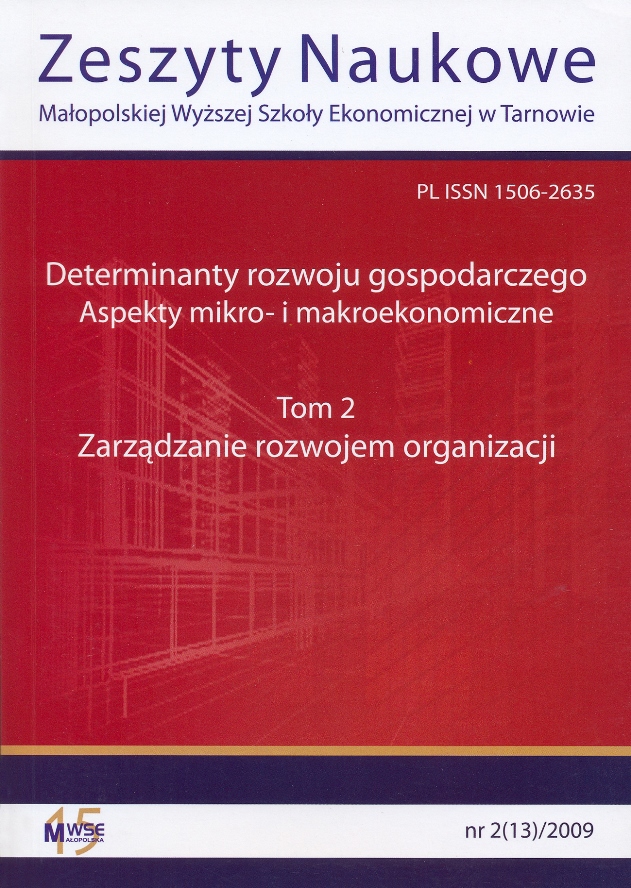Abstract
In the contemporary world effective management of an organization and creating its future have become the domain of the people, who are its employees and represent its capital. Stocks and financial resources, their quality and effects they bring, depend on the people who use them to make products and services, which are willingly purchased by customers. Among many functions of managing human resources, one of the most important roles is motivation, aiming at proper development of motivation and conducting it in such a way so that the employees could be properly involved in their work and duties. The aim of this article is to show a variety of factors, called motivating factors, which are used in management and verification of the thesis, that only properly formulated and implemented motivating policy assures the right realization of the aims set by an enterprise. The basic issue conditioning the efficient use of motivating systems is adapting them to the external and internal environment of a corporation. It means giving the corporation adaptation abilities and absorbing changes in both external and internal environment.
References
Ackoff R.L. 1993. Zarządzanie w małych dawkach. Warszawa: PWE. ISBN 83-01-11119-4. Armstrong M. 2003. Zarządzanie zasobami ludzkimi. Kraków: Oficyna Ekonomiczna. ISBN 83-8859-758-2.
View in Google Scholar
Celińska-Niecharz S. 1999. Cena dobrego pracownika - system motywacji a oczekiwania zatrudnionych. "Personel" nr 7-8.
View in Google Scholar
Chabik J. 2000. Firma przy tablicy. "Computerworld" nr 19, s. 38.
View in Google Scholar
Crozier M. 1993. Przedsiębiorstwo na podsłuchu. Jak uczyć zarządzania postindustrialnego. Warszawa: PWE. ISBN 83-2080-908-8.
View in Google Scholar
Jasiński Z. 1998. Motywowanie w przedsiębiorstwie. Warszawa: Agencja Wydawnicza "Placet". ISBN 83-8542-829-1.
View in Google Scholar
Koźmiński A.K., Piotrowski W. 1997. Zarządzanie. Teoria i praktyka. Warszawa: Wydawnictwo Naukowe PWN. ISBN 83-01-12148-3.
View in Google Scholar
Krzakiewicz K. 1996. Teoretyczne podstawy organizacji i zarządzania. Poznań: TNOiK. ISBN 83-9059-120-0.
View in Google Scholar
Mikuła B. 2000. Nowe sposoby na zasoby. "Personel" nr 11, s. 20-22.
View in Google Scholar
Nizard G. 1998. Metamorfozy przedsiębiorstwa. Zarządzanie w zmiennym otoczeniu. Warszawa: Wydawnictwo Naukowe PWN. ISBN 83-0812-623-X.
View in Google Scholar
Penc J. 1998. Motywowanie w zarządzaniu. Kraków: Wydawnictwo Profesjonalnej Szkoły Biznesu. ISBN 83-8544-161-1.
View in Google Scholar
Revans R. 2000. Przedsiębiorstwo uczące się. "Manager" nr 4, s. 56.
View in Google Scholar
Szapiro T. 2004. Dane ważne jak kapitał. "Businessman Magazine" nr 2, s. 51.
View in Google Scholar
Weber R.A. 1990. Zasady zarządzania organizacjami. Warszawa: Wydawnictwo Naukowe PWN. ISBN 83-2081-036-1.
View in Google Scholar
Zbiegień-Maciąg L. (red.). 2006. Nowe tendencje i wyzwania w zarządzaniu personelem. Kraków: Oficyna Ekonomiczna. ISBN 83-7484-028-5.
View in Google Scholar
Ziębicki B. 2000. Tworzenie organizacji inteligentnych. "Ekonomika i Organizacja Przedsiębiorstwa" nr 8, s. 11-13.
View in Google Scholar
Zimniewicz K. 1999. Współczesne koncepcje i metody zarządzania. Warszawa: PWE. ISBN 83-2081-190-2.
View in Google Scholar
© Copyright by Małopolska School of Economics in Tarnów. The articles are available under the Creative Commons Attribution NonCommercial-NoDerivatives 4.0 International License


